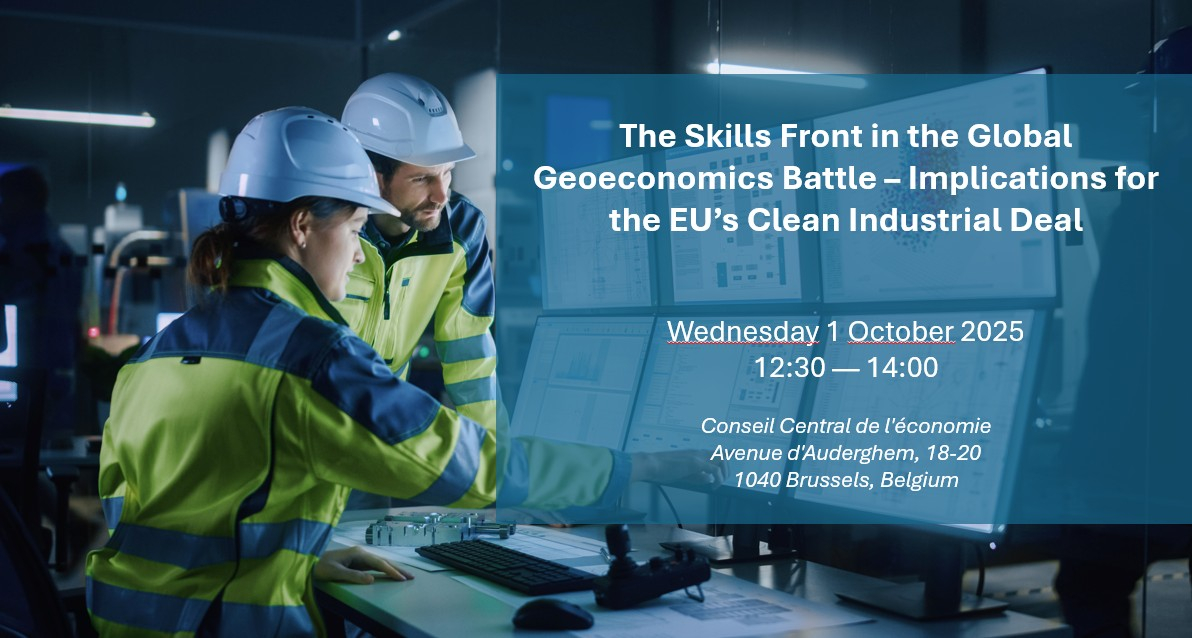The Skills Front in the Global Geoeconomics Battle – Implications for the EU’s Clean Industrial Deal

Practical information
Accessibility
Themes and regions
Related centers and programs
This is a private event.
Learn more about our corporate support packages
In the global race for mastering and deploying clean energy technologies, the available and well-trained workforce is a crucial success factor, with China already a green skills superpower: 90% of its energy jobs growth are in the clean energy sector and the country accounts for about 80% of global employment in the batteries sector.
The EU has correctly identified skills as critical for the implementation of the Green and Clean Industrial Deals. Several sectors are already in tension and could well run into further difficulties. The EU, Member States, regions and local actors, industries and academic institutions will not only have to work more together, but to come up with innovative solutions and share best practices. Boosting vocational training, ensuring EU-wide labour mobility and reaching out to people far from employment, working on awareness raising and improving the attractiveness of industries, and providing lifelong learning schemes will matter too.
How are industries in traditional and new clean technologies sectors mobilizing to break the skills conundrum? What are the different strategies possible for which results? What lessons can the EU and Member States learn from ongoing efforts in this field in order to improve their skills policies? How does the EU fare in the international race for talent in clean tech and what kind of collaboration is possible, with whom?
Agenda
12:00-12:30: Light lunch buffet
12:30-12:40: Introduction and highlights from Ifri’s study on the strategic dimension of skills in the energy transition
12:40-12:50: Keynote speech by Jeroen Jutte, Director for Employment and Social Governance, Analysis, DG EMPL, European Commission
12:50-13:40: Panel discussion
- Jeroen Jutte, Director for Employment and Social Governance, Analysis, DG EMPL, European Commission
- Denis Guibard, Chief Scientific, Academic and Sustainability Officer, Terra Academia
- Marcela Mantilla, Sustainability and European Industrial Affairs Advisor, RTE Presidency
- Jacopo Piccagli, Policy Officer, Solar Power Europe
- Oana Penu, Director, InnoEnergy Skills Institute
13:40 – 14:00: Questions and answers
14:00-14:30: Coffee and mignardises
This event is accessible on invitation only and will be held in English.
Contact
For additional information regading this event, please contact
Alexandra Bor, Center for Energy and Climate assistant: [email protected]
Related Subjects
Other events

EV Supply Chains for Japan and Europe: Strengthening Economic Security
Economic security aims to ensure the resilience of supply chains for key industries: the case of electric vehicle production in Japan and Europe will be discussed.

What Kind of Technological Partnership with India?
As India asserts its technological ambitions and seeks to reduce its dependence on China, Europe is stepping up its efforts to diversify its strategic partnerships. What opportunities arise from the convergence of these two dynamics? Can cooperation in cutting-edge sectors—from electric vehicles to artificial intelligence and semiconductors—transform the Indo-European relationship into a lever for strategic autonomy?






